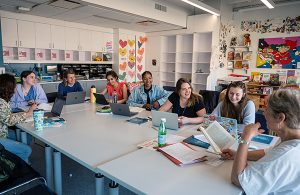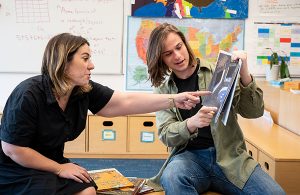Contact Us
-
Graduate Admissions212-875-4404
-
Content Specialist, Supervised Fieldwork Advisor, Course Instructor917-751-3415
-
Supervised Fieldwork Advisor & Course Instructor212-875-4549
Reading and Literacy Programs
MSEd
-
Program Overview
Our Reading and Literacy Programs prepare you to work across grade levels, providing a greater range of teaching opportunities. These programs are for educators who seek to deepen their literacy teaching methods, become reading specialists or literacy coaches who develop literacy curriculum that applies culturally responsive pedagogies.
Using multicultural literature as a foundation for teaching literacy, coursework integrates peer-reviewed reading research with practices that are informed by evidence-based teaching methods for early childhood through high school. Students critically examine foundational topics about oral language development, phonemic awareness, decoding and phonics, reading comprehension, writing, and assessments designed to guide differentiated instruction for a range of children including neurodiverse and multilingual learners.
Students study the larger socio-cultural contexts of literacy education that includes an historical review including the most recent iteration of reading methods, known as the Science of Reading. Students critically analyze the literacy programs currently used in schools to integrate culturally responsive methods to center children’s learning.
Supervised fieldwork at partner schools in New York City coordinates with coursework throughout the program, enabling students to make deep connections between theory and practice.
Two Program Options to Fit Your Needs
We have two options for candidates with different kinds of experience:
- Reading and Literacy: Inclusive Teaching leads to New York State professional certification in Literacy–All Grades (Pre-K-12)—that can open up opportunities to work as a reading intervention teacher, a school-based leader in literacy, and a classroom teacher with increased expertise in literacy. Admission requires certification in Early Childhood, Childhood, or Special Education.
- Reading and Literacy: Non-Certification doesn’t require certification for admission. This option is for teachers in independent schools, career changers, and those working in supplemental educational settings that don’t require state certification.
In addition to in-person classes, a portion of our courses meet online for flexibility. The coursework for the two program options is identical. Both lead to a Master of Science in Education and students can complete the 33-credit program while they continue teaching in their current positions.
Highlights
- Small class size and faculty/student ratio, which provide opportunities for collaboration, in-depth learning, and individualized coaching
- Rolling admissions and the flexibility of starting in fall or spring
- Scholarships and financial aid available
- A program plan that you can complete in 18 months while you continue teaching in your current position
- Additional certification that may increase your salary

-
Admissions Requirements
Applicants should review the main admissions criteria before applying to either of these programs. For the Reading and Literacy: Inclusive Teaching program, applicants must already hold a valid initial New York State certification in Early Childhood or Childhood General or Special Education.
-
Coursework
-
Supervised Fieldwork/Advisement
Supervised fieldwork and advisement are at the heart of a Bank Street education and take place at partner schools in New York City.
Through sustained experiences in the field, supervision from core faculty, advisement from on-site mentor teachers, and close collaboration with peers, you’ll develop the ability to connect theory to practice and to reflect deeply on your own growth as an educator.
- Advisement: Learn from an experienced educator—your faculty advisor—who regularly conducts on-site visits to observe and gain context about what skills you need to refine and advance.
- Practicum: Two core practicum courses enable you to put your learning into context: Clinical Practicum in Teaching Literacy to Children with Language and Learning Disabilities and Clinical Practicum for Teaching Literacy Across the Content Areas.
-
Career Opportunities
Your degree will provide you with a range of career opportunities:
- Teach in classrooms with increased depth in literacy across grade levels
- Teach as a reading and literacy specialist in schools, supplemental programs, and in private practice
- Work as a literacy coach to deepen literacy practice for other teachers
- Earn a higher salary with an additional certification
Graduates who choose to teach outside of New York State can usually arrange for reciprocity for teaching certification in their new location.

-
Faculty
 Susie RolanderContent Specialist, Supervised Fieldwork Advisor, Course Instructorsrolander@bankstreet.edu 917-751-3415
Susie RolanderContent Specialist, Supervised Fieldwork Advisor, Course Instructorsrolander@bankstreet.edu 917-751-3415 Mollie Welsh KrugerSupervised Fieldwork Advisor & Course Instructormwelshkruger@bankstreet.edu 212-875-4549
Mollie Welsh KrugerSupervised Fieldwork Advisor & Course Instructormwelshkruger@bankstreet.edu 212-875-4549

Meet Our Alumni
- Xiania Foster teaches literacy courses at the Bank Street Graduate School of Education and has been a teacher, principal, staff developer, literacy coach, and consultant. This article features her work with teachers to help them improve reading instruction. Read more >>
- Shelby Brody is a certified literacy specialist who taught grade 5 humanities at Bank Street’s School for Children while earning their master’s degree. Shelby is currently a fourth-grade head teacher at Grace Church School. Watch her video >>